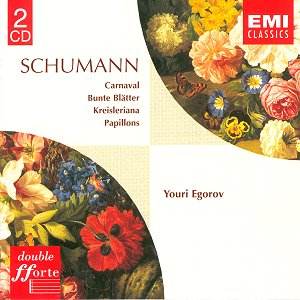Robert SCHUMANN (1810-56)
Carnaval, Op. 9. Toccata, Op. 7. Arabesque, Op. 18. Bunte Blätter,
Op. 99. Kreisleriana, Op. 16. Novelettes, Op. 21 - No. 1; No.
8. Papillons, Op.
2.
 Youri Egorov
(piano).
Youri Egorov
(piano).
 EMI Double Forte CZS5
74191-2 [two discs] [ADD] [147'23] Recorded
1978-85.
EMI Double Forte CZS5
74191-2 [two discs] [ADD] [147'23] Recorded
1978-85.
Crotchet

Youri Egorov won second prize in the 1974 Tchaikovsky Competition. His playing
on these discs is a curious mix of exquisite touch and a tendency to the
overly brutal. Egorov's use of the pedal is well considered throughout, so
that textural clarity is beautifully controlled. Perhaps Schumann's unstable
personality suited Egorov's playing particularly well, as the schizophrenic
juxtapositions are often presented in the starkest of terms.
Carnaval is mostly successful. The twelfth movement, Chopin finds
Egorov at his most inspirational, the right hand beautifully shaded, the
left smooth: when he gets it right, he really does get it right. The fast
movements are uniformly very fast (in the case of the ninth movement,
Papillons, almost typewriter-ish), Paganini appropriately stormy.
Only the last movement (Marche des 'Davidbündler' contre les
Philistins) is overly relentless, which tarnishes the effect of the whole
performance somewhat. This latter trait is continued in his disappointing
performance of the Op. 7 Toccata.
The 1978 recording of Kreisleriana seems to float on the surface of
Schumann's thought, and the listener never really gets dragged in. Instead,
one admires Egorov's crystalline finger work and technique, but it is to
the expense of the musical substance. The second movement, marked Intissimo
e non troppo allegro emerges as merely ponderous, bereft of its magic.
A strong vivace seventh movement feels as if everything has clicking
into gear too late.
Bunte Blätter exhibits Egorov's trademarks well: the slow passages of
the first section are well shaded, but the over-emphatic second section reminds
one of the final movement of Carnaval in its unflinching insistence.
Similarly, whilst there is contrast between the sections of the
Novelette, Op. 21 No. 1, it is overdone by the brutality of the opening
(which should instead be heavy and forceful).
This set provides a useful selection of major Schumann piano works at a similarly
useful price. Egorov is capable of illumination and telling Romantic
introspection at his very best, but capable of crass over-emphasis at his
worst. He is always well served by EMI's recording. However, there are many
alternatives for the two major works here, Carnaval and
Kreisleriana. Argerich's Kreisleriana is characteristically
high-powered and intense. Bolet provides one of the best modern
Carnavals on Decca 417 401-2, and Uchida is her highly sensitive,
always ultra-musical self on Philips 442 777-2.
Reviewer
Colin Clarke
Performance

Recording


